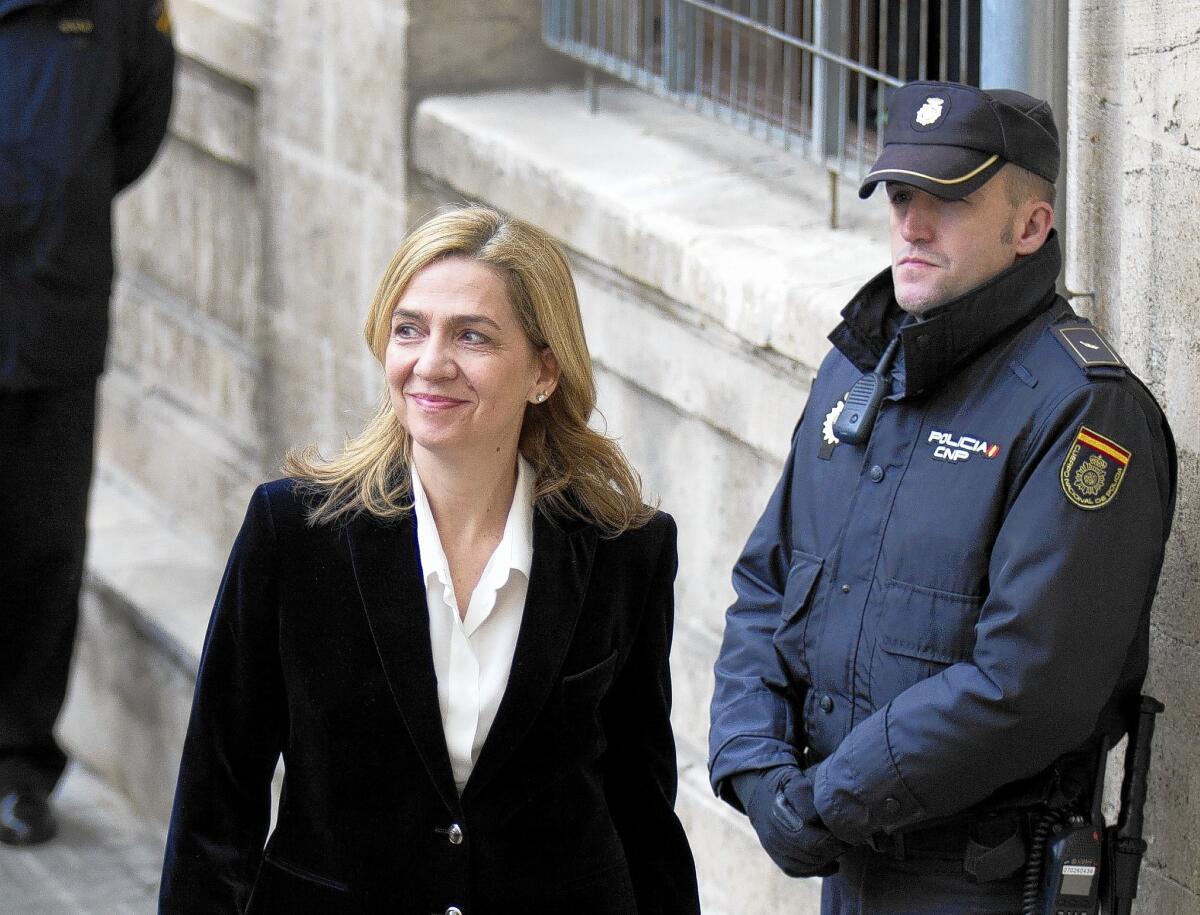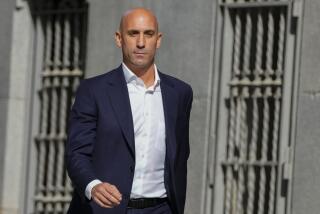Spain’s Princess Cristina and husband charged in tax fraud inquiry

Reporting from Madrid — Days after her brother was proclaimed king, Spain’s Princess Cristina was indicted Wednesday on charges of tax fraud and money laundering, paving the way for an unprecedented trial that could further damage the royal family’s reputation.
If convicted, the princess, known as Infanta Cristina, faces up to 11 years behind bars. She and her husband, former Olympian Iñaki Urdangarin, have been under investigation for years on allegations of the embezzlement of about $8 million in public money through charitable sports foundations they ran.
Cristina testified before a judge on the Spanish island of Mallorca in February, denying any knowledge of criminal dealings.
On Wednesday, the judge found sufficient evidence to proceed with charges of money laundering and tax fraud against the princess and nine other counts against her husband, and recommended that they go on trial. Fourteen other people, including Urdangarin’s former business partner, were also charged.
“There are many indications that Cristina profited from illegal funds on her own behalf, and also helped her husband to do so, through silent cooperation and a 50% stake in his business,” Judge Jose Castro wrote in his 167-page indictment.
Lawyers for the couple have five days to appeal the indictment. No trial date has been set. In a statement, the royal palace declared its “complete respect for the independence” of Spain’s judiciary.
Legal experts say the judiciary is under pressure to demonstrate that all Spaniards, even royals, are equal under the law.
“Our penal code allows both a fine and/or imprisonment for such charges. It depends on the judge,” said Beatriz Goena, a Spanish criminal law expert at the University of Navarra. “Often for economic crimes, the penalty is a fine, but people also go to jail. We have some politicians facing these situations right now. It’s probable that Urdangarin will go to prison [if convicted] but less so for Cristina.”
The 49-year-old princess is one of King Felipe VI’s two older sisters. She was conspicuously absent last week from ceremonies celebrating her brother’s formal ascension to the throne that their father, Juan Carlos, had occupied for nearly four decades.
Juan Carlos is credited with ushering Spain into democracy in the late 1970s. But his popularity never recovered after he went elephant hunting in Africa in 2012, angering Spaniards at a time of deep recession and massive unemployment. One in four Spanish workers remains jobless. The monarchy’s approval ratings remain at historic lows.
Last year, Cristina was cut from the royal household’s budget, and any mention of her husband was removed from the royal palace’s website. The couple live in Geneva with their four children.
Despite her legal woes, Cristina retains the title Duchess of Palma de Mallorca and remains sixth in line to the Spanish throne. Only the king has legal immunity.
Near the palace, where thousands of Spaniards cheered the royal succession less than a week ago — their country’s first in its democratic era — tourists and locals glanced up at a television at an outdoor cafe carrying Wednesday’s news of the princess’ indictment.
“It’s horrible for the monarchy! They have many problems inside their family and out,” said Guillermo Berriochoa, 48, who is unemployed. “I hope that Cristina goes to prison if she’s guilty, and that justice is the same for everybody.”
Frayer is a special correspondent.
More to Read
Sign up for Essential California
The most important California stories and recommendations in your inbox every morning.
You may occasionally receive promotional content from the Los Angeles Times.










